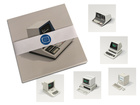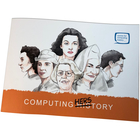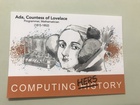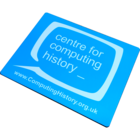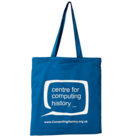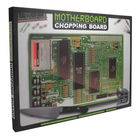
| Home > LEO Computers > Lyons Electronic Office (LEO) Archive > CMLEO/FL - Frank Land Collection > Oral history interviews > Robert Thoday: Interv ... 6 April 2021, 70781 |
Robert Thoday: Interview, 6 April 2021, 70781
| Home > LEO Computers > Lyons Electronic Office (LEO) Archive > CMLEO/FL - Frank Land Collection > Oral history interviews > Robert Thoday: Interv ... 6 April 2021, 70781 |
Copyright
Robert Thoday and the LEO Computers Society
Digital audio of a recorded interview with Robert Thoday, who joined Lyons in 1960 as a programmer on LEO I.
Interviewer: Mike Hally
Date of interview: 6 April 2021
Length of recording: 6m46s
Copyright in recording content: Robert Thoday and the LEO Computers Society
Abstract: Joined Lyons as a programmer, working to maintain LEO I programs while also working on new programs for LEO II including payroll. Left as LEO III was being introduced to move through a variety of jobs. Date : 6th April 2021Transcript : Mike Hally: So itís the sixth of April. And Iím Mike Hally. Iím interviewing Robert Thoday to give us the story of his involvement with LEO Computers from the earliest days. We are recording this interview as a part of the LEO Computers Society Oral History Project. The audio version and the transcript will be lodged as a central archive made available for researchers and members of the public. So, good afternoon, Robert. Perhaps youíd like to introduce yourself first. Robert Thoday: Where do I start? My name is Robert Thoday. I was born in 1943, during the War, although, obviously, my memories are extremely episodic of that. MH: Can I just start with a little bit of background? Long before we get to LEO. So what did your father and your mother do? RT: My father was a commander in the navy, Royal Navy. My mother a housewife, as was quite usual in those days. MH: Absolutely. RT: And I then was brought up - well, I was born in London, or just outside. But then I moved to Coventry, which I thought was a very wise move. And Hitler followed me. Then I was North Wales, in Devon, because my father moved to Plymouth with his career. But then finally ended up in Bromley when I was nine years old. MH: Right. In those very early years, before, perhaps even, you went to school, have you any particular memories from that early time? RT: Any particular memories? I loved Dartmoor.. Not particular, no. I mean, just normal sort of childhood memories, I suppose, yeah. MH: What sort of childhood interests did you have? I mean, I remember, obviously meccano, that was one of my big things which (overlapping conversation) - RT: Yeah, well, I certainly had meccano but I was much more interested in outdoor things. I did play sports quite a lot, but, actually, I just enjoyed running and cycling most of all, Things on my own rather than with others - I had two elder sisters. But they went to different schools. We got on perfectly well, but we didnít actually do a lot together, if you see what I mean. MH: Sure. So tell me about your schools then? Just briefly, your primary school and your secondary school. RT: Well, once Iíd moved to London, which, as I say, was when I was coming up to nine, I went to Dulwich Prep School. And then from there, obviously went onto Dulwich College, . MH: So was that helped by your father being in the navy? Or was that coincidental? RT: No, not - I mean, he wanted me to. I think he had to pay fees for the prep school. But at Dulwich College, I got a Kent scholarship, so he didnít have to pay for that. And I was just a day boy then, not a boarder. MH: What were your subject - what particularly interested you at school in those days? RT: Well, thatís a long story, Mike, actually. Because I was mostly interested in English and History. But somehow, between my father and the school, I got pushed into doing science, and then into mathematics for A level, soÖ MH: Well, letís have a brief diversion because I think itís one of the awful things about the school system in those days. Likewise, I loved English, in particular. But I also loved physics, and chemistry, and maths. And I had to choose between the two, which is, I think, disgraceful. RT: Yeah. (overlapping conversation) I donít know about your schooling, but yes, I had to choose at 13, I mean, even before O levels. MH: Absolutely, yeah. It was a choice at 13. And pupils who were in the sort of the middle were pushed towards science because that was seen to really be a good thing. RT: Yeah. Well, I mean, my fatherís case, to be fair to him, he had a degree in physics. So that was natural for him to go that way. And I canít actually remember anybody ever asking me what I wanted. It was just sort of like decided for me. MH: Again, that was those days, wasnít it? That was the norm, I think. RT: Yeah, exactly. MH: So what about O levels and A levels? What did you do there? RT: Well, I did the whole, range of O levels. So I think I got 10 or 11 in the end. But, I mean, that was sort of fairly normal. But then I went onto maths. And I mean, pure maths, applied maths, maths, maths, with a bit of physics. So, actually, at A level, I just did pure maths, applied Maths, and physics. That was all. MH: Exactly the same here. And going on - presume you went on to university, did you? RT: No, I didnít. Because in my final year, when I was taking A levels as I say, I wasnít ever that interested. So I didnít want to go to university, particularly, or not to do Maths anyway. And my parents were in the middle of an extremely messy divorce then. And, quite honestly, I just wanted to get out and earn a living. So that coincided, in fact, with me not wanting to go to university anyways. So then I was just looking for a job, basically. I didnít really know what. And Joe Lyons set an advert for this thing called computer programmers and wanted people with A level maths. And so I just fell into by chance because even my maths teachers at school didnít know what a programmer was or a computer was. Most of us had heard of, Alan Turing and Bletchley Park, and that was about it, really. MH: So what date are we talking about then? What year would that be? RT: 1960. I think I started with them in September. It mightíve even been Aug . I did my A levels in June, July. And (audio breaking) started work shortly afterwards. MH: Good. Well, now, weíre into the meat of what the Societyís interested in, of course. So what can you tell me about starting that job, and the training, and so on? RT: Right. Well, bear in mind, I didnít know what a computer was, a programmer was. And I donít suppose anybody else much did in those days. They were very (overlapping conversation) - MH: I should ask you then, what was the interview process, the selection process? Did they test you (overlappingconversation)? RT: I think they had some kind of aptitude test. But there was - in those days, this is Cadby Hall, Joe Lyons - an Organisation and Methods Office, which Iím sure you understand (overlapping conversation), but in case listeners donít. In those days, there were two disciplines, Organisation and Methods, which was (audio breaking) to do with office procedures, administration systems, and Work Study, which was the equivalent on the factory floor. So there was an Organisation Methods Office. And there - five, maybe six Organisation Methods people, two Work Study people, and two people I can remember on the Organisation Methods side that had learned to programme as obviously their job function was changing. But there werenít any ďprogrammersĒ as such, One other was recruited with me and I think he was called Roger Emsley - I donít know if youíve come across that name. MH: I think I have. RT:. There were two of us taken from school, doing A levels. And in those days, of course, LEO Computers already been hived off into a separate company. And they wereÖ Iím trying to remember the name of it now. In the Bayswater Road, over a department storeÖ (audio breaking) it will come to me. MH: It was Whiteleys, wasnít it, I think? RT: Whiteleys, thatís right, yup. That was quite right, yes. Yes. So they were there. So, basically, myself and this other guy, who I think was Roger, were taken on to maintain LEO One programmes, all of which had been written by - originally, obviously, by LEO personnel. There wasnít anybody in Joe Lyons that knew how to programme LEO One. And also to maintain and write new programmes for LEO Two. And the training, which was very good , Joe Lyons in those days were renowned for their training. It helped to get me jobs years later. The programme training was done by LEO people in Whiteleys. So we went there for the course. And Joe Lyons ran various sort of courses all to do with office management, printing, form design, you know, lots of little evening classes, as it were. Which didnít have any qualifications or anything, but, obviously, gave you a very good grounding in all that kind of thing. MH: Didnít you remember any of the people who were actually doing the LEO training for you? RT: I canít remember., I remember names, but whether they were doing the courses, I really canít remember. Theyíre names that everybody knows, Iím sure. So, you know, Frank Land, David Caminer, people like that. But I cannot remember their faces or, actually, if they ran the courses. They maybe supervised them, I just donít know. MH: So was it still quite a small, close-knit group then that ran the LEO? RT: Oh, yes. Very much so, very much so. And although it was then, obviously, separate from the Lyons operation, as it were, there was constant communication back and forth, you know. They had all sorts of things, whatever it was, because the programming side was obviously, sort of, very much in its infancy, and people were almost making it up as they went along, kind of thing. So, yeah, we certainly used to refer back to David Caminer about various things. Because, obviously, he knew what we didnít. And there were probably other people, but I canít remember other names as such, no. MH: But what was it like working in that atmosphere? Because, as you say, it was all new, very few people knew about computers and programming. Was it very exciting? RT: Oh, yes,. Well,, for me, at a personal level, it was exciting. I was earning enough money to rent a little bedsit, get away from my parents, be independent. But it was just sort of different, and it was all new. And having, obviously, no, preconceptions whatsoever, you know, sort of everything was a new experience. And, obviously, very much a learning one, yes. MH: And what were the sort of projects you worked on? Are there any particular you can remember? Can you recall? RT: Well, letís just say, LEO One was purely maintaining the old programmes. I cannot remember any detail about it. The first major thing I worked on LEO Two was a payroll programme. And I also worked with a guy whose name might have come up as well, Ted Averill, who was trying to develop the Lector optical reader. Sort of disappeared eventually because it wasnít that good, obviously. But so I worked with him on that. And, as I say, it was also maintaining things. You know, just - so there was an invoice programme. There was project - I canít remember now the -to do with the Bakery side. But it was a very big grounding once I spent a whole day just sitting in a tea shop, taking notes of who was coming in and out, and, you know, that kind of thing. The computing was obviously the main job. But theyíre very much concerned with teaching you all about, management, office systems procedures, etcetera, etcetera, etcetera. I know it wasnít a result of my personal work, but in the tea shop, someone eventually came up with, if they put two and a half teaspoons of tea in the pot, rather than three, they could save so much money and the customers didnít notice the difference. It was that kind of thing. So quite interesting, yes. MH: And I suppose also there was a feeling that the computing, the programme would be better if you properly understood what it was being used for. RT: Oh, yes, yes. Well, exactly. So, I mean, you, you know, were very involved with a lot of aspects. And the programme was sort of like the last thing on the end. So, for example, to do the payroll programme - and I was the lead programmer for that, I suppose - I just spent two whole weeks working in the payroll office to find out exactly what they did. You know, because, obviously - MH: Very good. Because Iím sure they can think of many examples since of off-the-shelf computers and programmes which are sold to companies to do this and that. RT: Yes. Exactly. MH: And they donít really work because the interface is the problem. RT: Thatís right, yes. No, so, I mean, it was - not ďphysicalĒ, itís not quite the right word, but you werenít just sitting at a desk, and you certainly werenít staring at a screen all day. You know, you were moving about, doing things, meeting different kinds of people, most of whom, of course, were a lot older than me. So they used to think, ďWhatís this 18-year-old, 19-year-old boy coming along trying to tell us what our job is?Ē So it gets quite interesting. And, obviously, one had to test - you know, you wrote entirely on paper, then after we test it. And because the machines were occupied most of the day, obviously, doing whatever the work was, all programme testing was at night. And youíre either just left your coding for them to try and came back in the morning to find it crashed in the first 10 seconds. Or if it was something a bit more urgent, you actually stayed the night. And then, because everything else was closed down, we were allowed to eat and drink in the directorís canteen, which was kept open 24 hours a day. So we used to get these wonderful meals, and even have a glass of wine with them sometimes, whilst you were checking out your programme, which was great. MH: And that, again, is a little insight into industry at that time, isnít it? The idea of separate canteens, different ranks of work. RT: Oh, god, yes, yes, yes, yes. Yeah, thatís right. MH: So moving on then, because you were only a few years at LEO, can you tell me how you finished (overlapping conversation) - RT: The last year I was at Lyons was when LEO Three was being introduced. And we were then using intercode, which you undoubtedly heard of. Because up until then, it had obviously all been machine code. And then I had different jobs with different companies, with different computers. So Iíve worked with IBM 360, ICL 1300, 1900, PDP, Honeywell, I donít know. Of course, every one of them had different languages, which I had to start again from scratch with. And it was only in the late Ď60s people started programming in COBOL, which, obviously, was the forerunner of Basic, really. So up until then, every time you changed computers, you had to learn a different language. MH: Yeah. So just going back a step, why did you leave LEO? Because it sounds like you were having a great time and it was a good education. RT: WellÖ Yes. Absolutely. I just wanted to move on. It was obviously based in the centre of London. As I say, Iím an outdoor type, basically. And having seen all the shows and seen all the films, as it were, which I enjoyed very much. You know, I just wanted some - so, first of all, I moved out near Oxford, which was seated more in countryside. And then I was near Bristol. MH: So which companies were those, were in Oxford and then Bristol? RT: Oxford was Pressed Steel-Fisher, which then became part of British Leyland. But at that time, they basically, well, pressed out car bodies and assembled basic cars, which were then trundled over to Morris Motors, you, for final whatever. And in Bristol, I worked for for a company called GB Britton, which you probably havenít heard of. But they were a shoe manufacturer. Basically army boots, work boots, that sort of thing. And there I ended up as the data processing manager at far too young an age, actually, because whilst I had the technical skills, but I didnít have the skills of handling 50 staff. Half of them were older than me. So that was difficult. And then after that I went freelance, and I worked for three years totally freelance. And in those days, as you probably know, there were computer services companies which, you know, had a computer, did the programming for a company, who either couldnít afford it or didn't want their own- so I did a lot of work for people like that on all sorts of projects, and different kinds of projects. RT: 1971, the last area , Ií worked on was actually decimalisation. And everybody suddenly converted. MH: Yeah, yeah. RT: And then I just wanted to do something different. You know, I believe, I always have believed, you only have one life, so experience things. And it wasnít that I hated computers. By then I was earning very good money, I was - it wasnít that. It was just that I thought, ďI just donít want to do this for the rest of my life. I want to go and do something else.Ē MH: So what was that? What did you do next? RT: Yet again, how long have you got, Mike? MH: It might have to be brief, but it would be interesting to know where you went. RT: Well, I spent six months managing a pub near [inaudible 00:19:57]. And then I leased a small island in Wales, which was a tourist attraction with a, childrenís zoo on it. And I ran that for three or four years. Then I had a small holding, which didnít work out, because my wife unexpectedly got pregnant and we decided we couldnít stay there. So then I had a shop in Devon. MH: Well, just stop you a moment. Thatís the first time you mentioned a wife, so when did you meet your future wife? RT: Oh, well, actually, the last year I was doing computer work in 1971. And that probably was a factor as well, of moving on, I mean. I just thought - you know, I was, as I say, working freelance, so I was working all sorts of hours and hopping on aeroplanes up to Liverpool, or wherever, Birmingham, you know. And I just, you knowÖ So that was a factor, probably. It wasnít the only one. Because quite the opposite, I said to her, Iím giving up computers and she was horrified. You know, ďWhat are you going to do? How are you going to earn money?Ē MH: So what was she doing? How was she earning? RT: She was a secretary, basically. Or what you call a man Friday or a woman Friday, I donít know. (overlapping conversation) MH: Nice. Yeah. So did you both work in the pub when you ran that? RT: No, I did that on my own for six months. Or I donít think it was even that long. My chronology has gone wrong, the pub was immediately after I left J.Lyons and before I started with Pressed Steel MH: Well, coming forward again, you mentioned the first pregnancy. So you had children as well? RT: Just the one. Just that one. It wasnít expected. She wasnít expected to, and she was more definitely not trying to [inaudible 00:21:50], so that was that. Which Iíve got no regrets about. That was fine. MH: But, again, that was another big change presumably in your life? RT: Yes, certainly. Yes. MH: So where were you by that time? What were you doing then? RT: Thatís when I bought the shop in Devon. MH: Right, yeah. RT: And then forÖ And by now weíre in the early Ď80s. And, obviously, PCs were available, and coming out and. And I did work for a couple of years for a company in Devon, who actually were, the forefront of optical character readers and scanners and everything. And they had the franchise from an American company for the whole of England. Iím not sure for all of Europe, but it never got that far, I donít think. So I got into that, not specifically as a programmer, which, obviously, the programming was quite limited anyway, or was in those days. It was coordination, and handling modems, and things like that. MH: So you hadnít put computing behind you completely then? RT: No, no. Oh, no. And I obviously got back into PCs. And programming them a bit, but only for my own pleasure, really. And then the company was taken over and made move to headquarters in London, and I was a offered a very good job. But in no way I wanted to move back to London, so that was the end of that. MH: So what about the years since? Can you bring it up to date? RT: All very briefly. MH: Yeah. RT: After that, for four years, something totally different. I ran my own industrial weed spraying business, would you believe? Totally different, exactly. And mainly working for local councils, the military, navy oil and gas companies. There was a certain amount of private work, but basically for big contracts, if you see what I mean. I did that for four years. And then just decided to sell it up for lots of reasons. And whilst I certainly wasnít rich, you know, I had a decent house, a decent car, etcetera, etcetera. Some savings in the bank. And I was then - what? 46, I think. 47, 48 - anyway, 46, 47. And for two or three years, I worked as a sort of financial consultant to small businesses, including helping them with their PCs. MH: Of course. RT: And then my wife and I split up. And I was just 50, and Iíd always wanted to live in France, so I basically retired to France at 50. Having now said Iím retired, I since refurbished completely four or five houses. So I bought them cheap, did them up, sold them on. I finished the last one about 18 months ago now. But it was, again, just for a totally different lifestyle. And, obviously, I was very aware - going right back to what you were saying why did I leave Lyons. I was suddenly aware I wasnít earning bad money but. half of my salary was going on accommodation and travel. So it takes a huge slice - and I thought, ďThis is silly. Go and live somewhere cheaper and donít travel. And you donít need nearly so much money.Ē It seemed obvious to me, butÖ MH: So it sounds like youíre very well-settled in France then? RT: Oh, yeah, totally, because Iíve been here now about - nearly 25 years, long time. MH: Yeah, yeah. RT: Itís certainly the longest Iíve lived anywhere in my life. MH: Right. It sounds like youíve been something of a rather restless person, both in where you live and where you work. RT: Oh, yeah, I am. Absolutely, yes. Forever jack of all trades, master of none, or something like that. I like doing different things. I like learning about different things. And once Iíve got to a stage - and, obviously, Iím not the expert, but Iíve got to a confident stage. I think, ďWell, Iíve done that. I want to try something else now.Ē And, you know, itís just different characters, different personalities, obviously. MH: Yeah. So just thinking back, how do you reflect on the significance of your time at LEO? RT: Oh, I think it was, you know, it was significant. It helped me to, like, go from childhood to adulthood and learn a lot on the way. And having briefly told you all about my history since, you know. Iíve used my training. The whole, way of dealing with people, projects problems whatever, People do MBAs, certainly. And I think Joe Lyons basically gave me an MBA without me paying for it. Because, certainly, over the years, Iíve known an awful lot of other small businessmen.. And just seeing the basic mistakes they all make, so many of them, you know. Either canít handle the money or canít budget properly. They might sound simple things, but, actually, if not taught them, youíd probably donít know how to do them, do you? Itís easy for me to say, itís easy. But, you know, I was taught it and I do appreciate that, very much so, MH: Yeah, itís easy to underestimate the skills youíve acquired, isnít it? Particularly advanced (overlapping conversation). RT: Yes, (overlapping conversation), absolutely. Yes, yeah. Yes. And all right, particularly nowadays, obviously people do degrees and MAs and, you know - so have bits of paper. Thereís nothing wrong with that at all But a plumber, for example or whoever learns on the job. Takes up all sorts of skills and experience, but not in a formal way, which isnít reflected on bits of paper, as it were. So, no. MH: Right, well, thatís actually quite a brisk run through, but I think weíve covered all the main points. Was there anything else you were hoping to add? RT: No. Well, if anybody of my contemporaries are still alive, hello. Obviously, most of the people I worked with at Cadby Hall, particularly, apart from Roger Emsley, were older than me. I mean, most of them in the in the O&M Department were in their 30s, you know. And I was 19, so, obviously, they could still be alive, but itís unlikely. And I wish them all well, obviously, wherever they are, whatever theyíre doing. And, yes, as I say, a big thank you to Lyons for what they did. MH: All right, well, and a big thank you to you - RT: (overlapping conversation) directly to LEO, who started it all, didnít they? MH: Absolutely. RT: Which is always a little bit of pride for me. People obviously ask, you know, ďWhat did you do?Ē or something like that. And, you know, I might just say, ďWell, I worked on LEO 1, the first programmed business computer.Ē And Iíll just say, ďGo and look it up on Wikipedia.Ē MH: Well, thank you as well. As I said, Iíve a little bit to read at the end now, so Iíll just read that. And if Iím reading as you think of something else you want to add, thatís fine. So this interview with Robert Thoday has been recorded by the LEO Computers Society. And the Society would like to thank him very much for his time and reminiscences. The interview and the transcript form part of an Oral History Project to document the early use of electronic computers in business and other applications, but particularly in business. Any opinions expressed are those of the interviewee, that is Robert Thoday, and not of the Society. The copyright of this interview in recorded form and in transcript remains the property of the LEO Computers Society, 2021. So thank you again. Unless thereís any further thoughts? RT: No, thanks. It really has been a pleasure, actually. MH: Good. This is great. Itís fascinating. Thank you very much. RT: Thank you, Mike. Thank you. MH: Okay. Iíll end it now then. Thanks. Provenance : This exhibit has a reference ID of CH70781. Please quote this reference ID in any communication with the Centre for Computing History. Copyright † † † |
† |
Click on the Images For Detail
|

